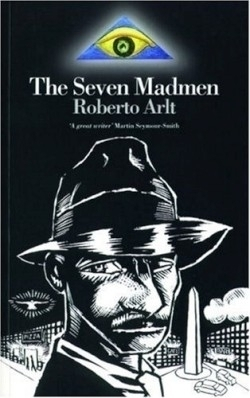
The Seven Madmen
A book written seventy years ago has just been translated into English, giving wider audience to Argentinean author Roberto Arlt’s work.
The Seven Madmen is set in Buenos Aires in the then-present-time of 1929 and opens with main character, Remo Erdosain, a self-described “hollow man, a shell moved simply by the force of habit” being accused of embezzling by his employer. That accusation sets loose a chain of events in his life, which ultimately lead him to a gathering of other discontents that make ruthless, detailed plans to set up a “bandit aristocracy.” Erdosain is an anguished, pained man whose diatribes portray him as one of the madmen of the title. Nothing goes right for him: his wife, Elsa, leaves him for another man and he’s a failed inventor. Darkness pervades his very being. In The Seven Madmen Erdosain is surrounded by various other characters, richly described by Arlt: Ergueta the pharmacist, a gambler with a religious side and his wife, Hipolita, a former prostitute; Gregorio Barsut, Elsa’s cousin, a boorish moneyed man who’s the focus of the madmen’s kidnap plot.
The madmen, headed by one called the Astrologer, believe it is “magnificent lies” that drive people on. As explained to Erdosain: “Men only respond to lies. (The Astrologer) gives lies the consistency of truth; people who never have so much as budged to get anything, guys who have become totally cynical and desperate, come to life again in the truth of his lies.” What happens to Erdosain and his cohorts is continued in Arlt’s third novel, The Flamethrowers (Los Lanzallamas), which followed in 1931.
Arlt, born in Buenos Aires in 1900 of European immigrant parents, grew up in the crowded rented tenement houses of that city—aptly described throughout the book. He worked as a journalist and his first novel was published in 1926 to little critical attention. The Seven Madmen (Los Siete Locos), published three years later, suffered the same results. Arlt died—in obscurity—of a heart attack in 1942. Nick Calstor, a senior producer at the BBC World service, has translated other Latin American works and also written several books of his own on the region.
Reviewed by
Robin Farrell Edmunds
Disclosure: This article is not an endorsement, but a review. The publisher of this book provided free copies of the book to have their book reviewed by a professional reviewer. No fee was paid by the publisher for this review. Foreword Reviews only recommends books that we love. Foreword Magazine, Inc. is disclosing this in accordance with the Federal Trade Commission’s 16 CFR, Part 255.
